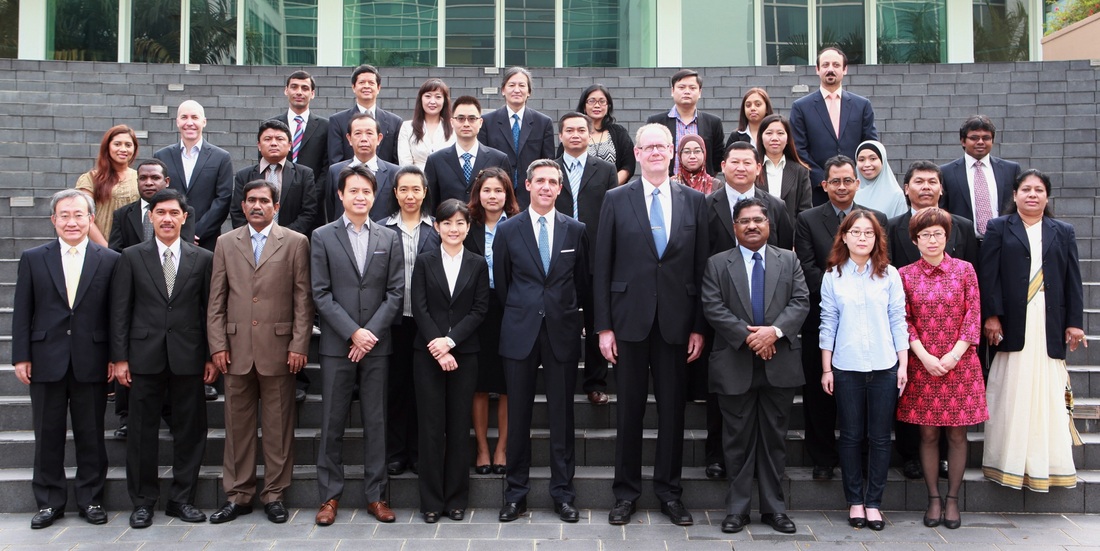City of Makati, Philippines – the Filipino Visual Arts and Design Rights Organization, Inc. (FILVADRO) through its President Karen Ocampo Flores represented the country in the two-day international conference held recently in Singapore organized by the World Intellectual Property Organization (WIPO).
FILVADRO, the first and only collective management organization (CMO) for visual artists and designers in the Philippines, administers and enforces the copyright and related rights of its members over their artistic creations. The Licensing Program is the flagship program of the organization. The Enforcement Program, Education Program, Registry Program and Policy Advocacy Program complete the five programs based on the principle of copyright as a basic human right.
International linkages such as FILVADRO’s participation in this seminar and forging bilateral agreements with the group’s foreign counterparts, membership campaign, and facilitating licensing agreements between the organization’s members and users of copyright are sub-programs of the Licensing Program.
Manisekaran Amasi, Senior Program Officer of the WIPO Copyright Infrastructure Division, listed five ideal situations for a CMO to thrive in any country: national laws should have specified provisions for CMOs; CMOs should be legally constituted; government should pay royalties to the artists to serve as an example; government should work closely with CMOs and; the dispute settlement mechanism such as the Copyright Tribunal should be established.
In his topic, “Threshold and Criteria of an Efficient CMO”, Amasi said that the government has four fundamental roles: establish a legislative framework, lead copyright awareness efforts, provide authorization to CMOs before they operate, and supervise the CMOs.
In the Philippines, Republic Act No. 10372 has been approved on February 28, 2013 which amended certain provisions of the Intellectual Property Code or Republic Act No. 8293. One of the highlights of the amended law is the creation of a new bureau – the Bureau of Copyright and Other Related Rights. Among the functions of the new bureau is to “accept, review and decide on applications for the accreditation of collective management organizations or similar entities”.
In late April, the Intellectual Property Office of the Philippines (IPOPHL) conducted its second consultation meeting for CMOs to set the accreditation guidelines. FILVADRO participated in this meeting with its sister-CMOs Filipino Society of Composers, Authors and Publishers (FILSCAP) and Filipinas Copyright Licensing Society, Inc. (FILCOLS).
“The regional seminar is a learning opportunity for FILVADRO as case studies and actual experiences were presented. It also enabled us to measure our growth vis-à-vis the examples provided by the speakers,” Ocampo Flores said.
“FILVADRO, although a very young CMO barely three years in operations, passes the CMO Performance Benchmarking (CPB) set by WIPO. We are a not-for-profit organization, our operations are transparent, and the Board of Trustees and Management are all professionals in their respective fields,” Ocampo Flores added.
Candra N. Darusman, Deputy Director of WIPO Office in Singapore, said that CMOs should act in the best interest of its members hence the need for the non-profit structure of the organization. Darusman likewise emphasized the need for transparency since trust is involved and the need to practice of professionalism through good corporate governance and competitive compensation packages for the CMO’s employees.
Twenty-one other countries participated in the regional conference billed "Regional Seminar on Collective Management of Copyright and Related Rights: Issues and Challenges in Effective Administration of CMOs". International copyright experts such as Amasi and Darusman discussed topics that ranged from the functions and roles of a CMO to the criteria of an efficient copyright organization. A panel discussion that tackled the formulation and implementation of regulations for CMOs was also in the program of activities.
Apart from the Philippines and the host country Singapore, the other attendees to the international conference represented Bangladesh, Bhutan, Brunei Darussalam, Cambodia, China, Fiji, India, Indonesia, Lao People's Democratic Republic, Malaysia, Mongolia, Myanmar, Nepal, Pakistan, Papua New Guinea, Republic of Korea, Sri Lanka, Thailand and Vietnam.
International linkages such as FILVADRO’s participation in this seminar and forging bilateral agreements with the group’s foreign counterparts, membership campaign, and facilitating licensing agreements between the organization’s members and users of copyright are sub-programs of the Licensing Program.
Manisekaran Amasi, Senior Program Officer of the WIPO Copyright Infrastructure Division, listed five ideal situations for a CMO to thrive in any country: national laws should have specified provisions for CMOs; CMOs should be legally constituted; government should pay royalties to the artists to serve as an example; government should work closely with CMOs and; the dispute settlement mechanism such as the Copyright Tribunal should be established.
In his topic, “Threshold and Criteria of an Efficient CMO”, Amasi said that the government has four fundamental roles: establish a legislative framework, lead copyright awareness efforts, provide authorization to CMOs before they operate, and supervise the CMOs.
In the Philippines, Republic Act No. 10372 has been approved on February 28, 2013 which amended certain provisions of the Intellectual Property Code or Republic Act No. 8293. One of the highlights of the amended law is the creation of a new bureau – the Bureau of Copyright and Other Related Rights. Among the functions of the new bureau is to “accept, review and decide on applications for the accreditation of collective management organizations or similar entities”.
In late April, the Intellectual Property Office of the Philippines (IPOPHL) conducted its second consultation meeting for CMOs to set the accreditation guidelines. FILVADRO participated in this meeting with its sister-CMOs Filipino Society of Composers, Authors and Publishers (FILSCAP) and Filipinas Copyright Licensing Society, Inc. (FILCOLS).
“The regional seminar is a learning opportunity for FILVADRO as case studies and actual experiences were presented. It also enabled us to measure our growth vis-à-vis the examples provided by the speakers,” Ocampo Flores said.
“FILVADRO, although a very young CMO barely three years in operations, passes the CMO Performance Benchmarking (CPB) set by WIPO. We are a not-for-profit organization, our operations are transparent, and the Board of Trustees and Management are all professionals in their respective fields,” Ocampo Flores added.
Candra N. Darusman, Deputy Director of WIPO Office in Singapore, said that CMOs should act in the best interest of its members hence the need for the non-profit structure of the organization. Darusman likewise emphasized the need for transparency since trust is involved and the need to practice of professionalism through good corporate governance and competitive compensation packages for the CMO’s employees.
Twenty-one other countries participated in the regional conference billed "Regional Seminar on Collective Management of Copyright and Related Rights: Issues and Challenges in Effective Administration of CMOs". International copyright experts such as Amasi and Darusman discussed topics that ranged from the functions and roles of a CMO to the criteria of an efficient copyright organization. A panel discussion that tackled the formulation and implementation of regulations for CMOs was also in the program of activities.
Apart from the Philippines and the host country Singapore, the other attendees to the international conference represented Bangladesh, Bhutan, Brunei Darussalam, Cambodia, China, Fiji, India, Indonesia, Lao People's Democratic Republic, Malaysia, Mongolia, Myanmar, Nepal, Pakistan, Papua New Guinea, Republic of Korea, Sri Lanka, Thailand and Vietnam.
Organizers, experts and delegates of the international copyright conference in Singapore: Denis Croze, Director of the WIPO Office in Singapore (front row, sixth from left); Pearle Kwan, Assistant Director of the Singapore Ministry of Foreign Affairs (front row, fifth from left) and; Daren Tang, Deputy Chief Executive of the Intellectual Property Office of Singapore (front row, fourth from left). Some of the speakers in the seminar were Manisekaran Amasi, Senior Program Officer of the Culture and Creative Industries Sector of WIPO Geneva (front row, fourth from right); Jorgen Blomqvist, Honorary Professor of the University of Copenhagen Faculty of Law (front row, fourth from right); Satoshi Watanabe, Deputy General Manager of the General Affairs Bureau of the Japanese Society for Rights of Authors, Composers and Publishers (JASRAC) in Tokyo (front row, first from left) and; Candra N. Darusman, Deputy Director of WIPO Office in Singapore (top row, third from left). Not in the photo is Intellectual Property Expert Ang Kwee Tiang.



















